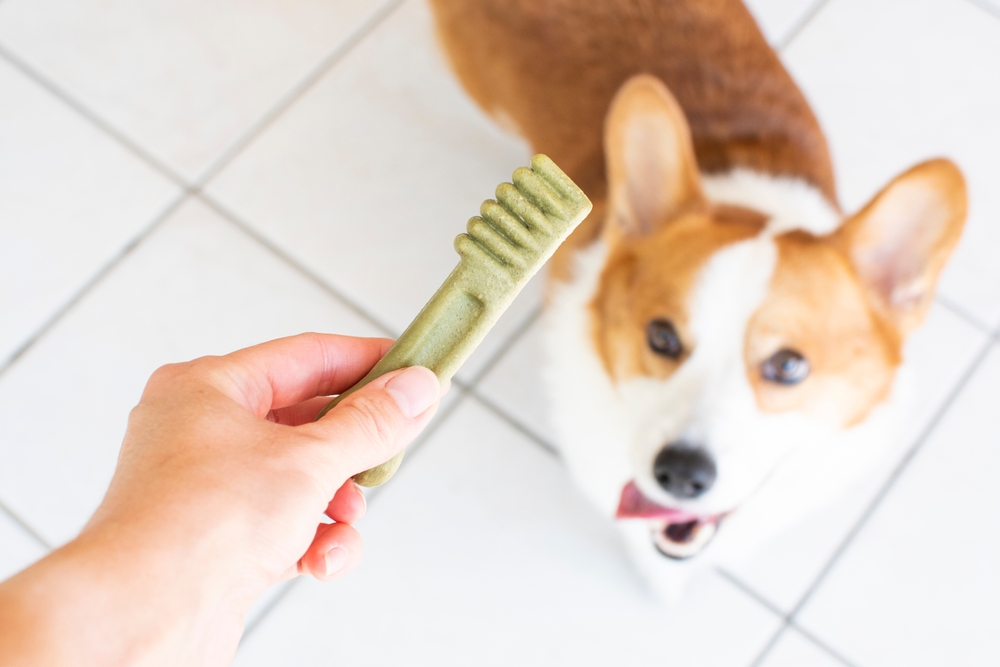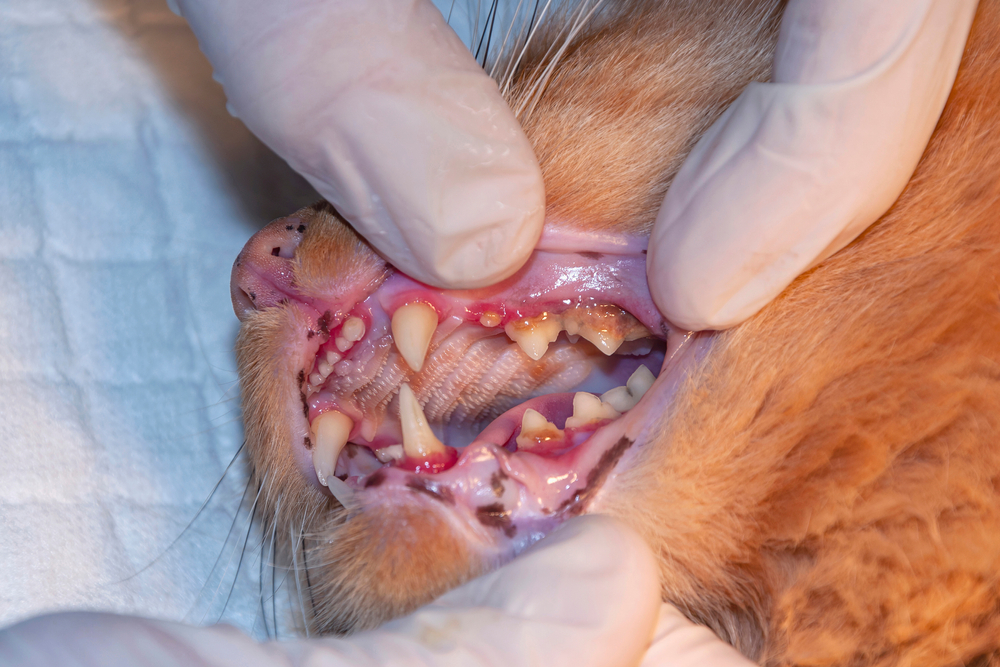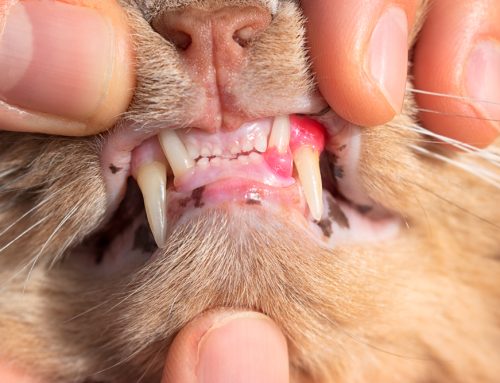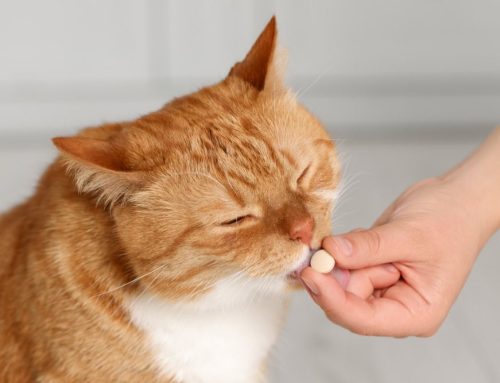Your dog or cat relies on their teeth for eating and playing. Unfortunately, periodontal disease can silently creep in, posing a significant threat to your pets’ overall well-being. Veterinary researchers estimate that up to 80% of dogs and 70% of cats have some form of periodontal disease by age 3. To learn how to ensure your pet’s oral health is optimal, read our Aberdeen Veterinary Clinic team’s guide to periodontal disease signs, causes, and preventive measures.
Recognizing periodontal disease signs in dogs and cats
Pets are masters at hiding discomfort, and you need to be proactive about checking for periodontal disease signs in your furry pal. Recognizing subtle periodontal disease signs is the first step to ensuring your pet’s dental health. Your pet may have periodontal disease if they exhibit these signs:
- Bad breath (i.e., halitosis) — Persistent bad breath is a common dental disease sign in pets.
- Eating habit changes — A sudden reluctance to eat or difficulty while chewing may indicate dental discomfort in dogs and cats. An affected pet may prefer soft food or chew on one side of their mouth.
- Excessive drooling — While some drooling is normal, an abrupt increase may signal oral health problems. Excessive drooling can be a dog’s or cat’s response to oral pain or irritation.
- Red or bleeding gums — Healthy gums should appear pink. Redness, swelling, or bleeding are dogs’ or cats’ oral inflammation and potential infection signs.
- Loose or missing teeth — Advanced periodontal disease can lead to tooth loss in dogs and cats, affecting their ability to eat and adversely affecting their quality of life.
Causes of periodontal disease in dogs and cats
By understanding pets’ periodontal disease causes, pet owners can take proactive measures to help prevent their furry pal from developing the disease. Periodontal disease’s primary contributors include:
- Plaque and tartar accumulation — Just like in people, pets’ plaque and tartar buildup is a bacterial breeding ground. Over time, plaque and tartar buildup can lead to inflammation and infection in dogs’ and cats’ teeth and gums.
- Poor dental hygiene — If you brush your pet’s teeth Infrequently or give them treats and toys that don’t contribute to their oral health, your pet can develop periodontal disease.
- Genetics — Some pets may be predisposed to dental issues because of genetic factors. Certain dog and cat breeds are susceptible to periodontal disease, reinforcing their need for tailored dental care.
- Age — As pets age, their dental health becomes more vulnerable. Regular veterinary checkups are crucial to monitor and address any emerging oral health issues.
Periodontal disease treatment: Professional veterinary dental cleanings
When treating periodontal disease in pets, our Aberdeen Veterinary Clinic team employs several strategies. The key treatment is a thorough professional dental cleaning, while your pet is under anesthesia. A professional veterinary dental cleaning allows our team to:
- Remove plaque and tartar — During your pet’s comprehensive dental cleaning, our team removes accumulated plaque and tartar, targeting areas that are inaccessible through at-home dental care.
- Examine oral structures — Our veterinarian can closely examine each tooth, identifying decay, damage, or instability while your pet is anesthetized.
- Polish teeth — After cleaning your pet’s teeth, we polish them to create a smooth surface, which helps inhibit plaque from quickly accumulating again.
- X-rays — Our team takes X-rays to assess the health of your pet’s teeth below the gumline.
- Antibiotics — In some cases, our team prescribes antibiotics after a pet’s professional veterinary dental cleaning.
Long-term periodontal disease health consequences in pets
Addressing periodontal disease is not just about maintaining a pet’s immediate comfort. Treatment has significant implications for your pet’s long-term health. Untreated periodontal disease in dogs and cats may lead to:
- Chronic pain — Periodontal disease can cause chronic pain, impacting a pet’s quality of life and overall well-being.
- Systemic health issues — The inflammation and infection associated with periodontal disease can contribute to systemic health problems, affecting a pet’s organs such as the heart, liver, and kidneys.
- Tooth loss — Advanced periodontal disease may result in tooth loss, affecting a pet’s ability to eat and leading to nutritional issues.
- Behavioral changes — Pets experiencing dental pain may exhibit behavior changes, including irritability, aggression, or reluctance to play.
Preventive dental care measures for dogs and cats

Prevention is the cornerstone of maintaining your dog’s or cat’s oral health. Consider these effective measures:
- Regular dental checkups — Schedule your dog’s or cat’s routine dental examinations with our veterinary team. Professional cleanings can prevent periodontal disease progression.
- At-home dental care — Establish a regular dental care routine at home for your dog or cat. Brush their teeth using veterinarian-approved toothpaste and provide dental chews or toys that promote oral health.
- Balanced diet — A nutritionally balanced diet contributes to your pet’s overall health, including their dental well-being. Consult our veterinary team for dietary recommendations tailored to your pets’ specific needs.
- Avoiding hard objects — Be cautious giving your pet hard toys or objects that may contribute to tooth damage. Opt for dental-friendly toys that support your furry pal’s oral health.
Periodontal disease may be a silent threat, but by taking proactive measures, you can safeguard your pet’s dental health. Regular veterinary checkups, at-home dental care, and a keen eye for your pet’s discomfort signs are your arsenal against this common issue. Schedule your pet’s dental cleaning with our Aberdeen Veterinary Clinic team. A healthy smile goes a long way in ensuring your furry pal leads a happy and fulfilling life.







Leave A Comment